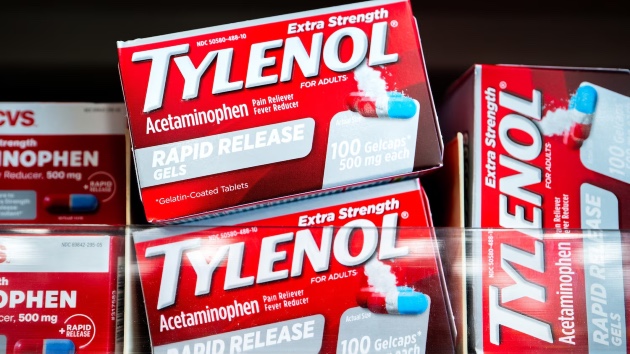What’s in your travel bag? Doctors share tips on what to pack for medical issues
Written by ABC Audio ALL RIGHTS RESERVED on March 27, 2023

(NEW YORK) — You added your destination on your weather app. Your out-of-office notification is on. Chargers — check.
But one thing you didn’t prepare for on your trip? An unexpected medical issue, possibly brought on by a red-eye flight that worked too well or the friends you’re visiting forgetting to tell you they have a new puppy — and you’re allergic!
ABC News asked doctors about must-have medications and products for travel that can relieve some of the pain and stress. Here’s what they had to say.
For your eyes
To look your best on vacation, you may need eye drops that get the red out from that overnight flight and lack of sleep. Dr. Alison Watson, an oculoplastic surgeon in Philadelphia at Wills Eye Hospital, recommends redness relief eye drops that contain low-dose brimonidine as the active ingredient. She says over-the-counter redness relief drops that don’t have brimonidine are not safe for regular use and can “make your eyes more dry over time or actually cause rebound redness.” Anyone having side-effects like burning or itching or having to use redness relief drops for long periods of time should check with a health care provider.
Also, petroleum jelly, commonly referred to as Vaseline, is “the perfect thing to throw in” and “can be safely used around the eyes as a moisturizer,” Watson said.
Watson said petroleum jelly can even double as a makeup remover, even for waterproof makeup. “Just put a thin layer [of Vaseline] right over top. It works especially well for mascara … and you can then wipe it off if you have a cotton wipe or tissue and your makeup will come right off.”
Another product to pack is an eye cream that contains vitamin C and caffeine. “Vitamin C is really brightening and then caffeine works to reduce puffiness,” Watson said. Caffeine constricts small blood vessels to help with redness and vitamin C is an antioxidant that can protect the skin from damage. “So if you’re having later nights than usual or diet changes, it can sort of help keep you looking your best in a pinch on vacation when you’re changing your typical routine,” she said.
Watson’s final travel tip is to “have fun out there,” but not without sun protection for your eyelids, including sunglasses. She says to look for “shimmer eyeshadows that have SPF built in so you can use it as your makeup and also to protect your eyelids from the sun.”
For your allergies
Environmental allergens can trigger your body to release a chemical called histamine, which when overproduced causes congestion, cough and a runny nose.
“Symptoms you weren’t experiencing in New York in February might be in full bloom in sunny Florida,” said Dr. Manav Segal, an allergist and immunologist at Chestnut Hill Allergy and Asthma Associates in Philadelphia.
If a stuffy nose is your main symptom, Segal said over-the-counter nasal steroids such as fluticasone, triamcinolone or mometasone “can be dosed when you need them.”
If you have asthma and it’s aggravated while on a trip, albuterol is not an over-the-counter medication, but is a rescue inhaler that you should talk to your doctor about having with you when you travel.
If your allergies have “nothing to do with the season and everything to do with … cats and dogs,” Segal said safe, effective allergy medications such as loratadine, cetirizine and fexofenadine are available over-the-counter.
The FDA allows for certain medications to be sold without a prescription. but still warns, “You should never misuse OTC medicines by taking them longer or in higher doses than the label recommends. Symptoms that persist are a clear signal it’s time to see a doctor.”
Consider an EpiPen …
With new foods and a new environment, allergic reactions are possible so doctors recommend packing an antihistamine like oral benadryl.
A general rule of thumb is if you have just one symptom, then you can try an antihistamine for relief. But if the reaction involves two symptoms or body systems, using an EpiPen is safest.
“So there’s hives, plus vomiting, or swelling, or any difficulty breathing like wheezing, coughing, then I start to worry that this is a reaction that’s going throughout the whole body and is a little bit more severe,” said Dr. Katie Lockwood, a pediatrician at Children’s Hospital of Philadelphia.
If you experience swelling that compromises your breathing or shortness of breath, administer an EpiPen immediately and call 911.
Getting an EpiPen requires first getting a prescription from your doctor.
Lockwood also said if you or your child has “a risk of a food allergy, or a venom allergy, like a bee sting allergy, and or have had anaphylaxis in the past, you should always travel with your EpiPen, because there might not be one available when you need it and they can be lifesaving.” Allergists recommend carrying two doses, as the reaction may reoccur.
Doctors say it’s always safer to err on the side of caution and give an EpiPen if you’re worried about an allergic reaction than to not give it. But if you end up using the EpiPen, you need to seek medical attention promptly afterward.
… and Insect Repellent
Insect repellant is also important to pack — and to apply after you’ve put on SPF 30+ sunscreen — when headed to locations where bugs and mosquitos are active. The most commonly available insect repellents contain the active ingredient DEET. The higher the concentration, the longer it will last. In infants at least 2 months old and children, DEET concentrations should not exceed 30%. Concentrations over 50% may last longer but provided no added benefit and those higher concentrations can be irritating to your skin. Other safe insect repellents are ones that contain picaridin and oil of lemon eucalyptus.
Inevitably, bugs seem to find a way to evade clothing and even bug spray barriers. When that happens, you want to have a topical steroid on hand to apply directly on the bug bites if they are causing itching or swelling.
A good over-the-counter, anti-itch cream to pack is hydrocortisone 1%. However, if you are prone to exaggerated reactions after bug bites or have a history of eczema, you may want to talk to your dermatologist doctor about having stronger topical steroids on hand and make sure you know how to safely use them.
Be Prepared
Doctors suggest bringing a three- to five-day extra supply of all your prescription medicines.
If you’re traveling, if you just pack enough for the vacation days and your return flight gets delayed, or there’s a terrible snowstorm and you can’t leave, you don’t want to be left without your medication,” said Dr. Nathalie May, associate professor of medicine at Drexel University.
Hopefully, your medication travel bag is untouched and it’s ready for your next trip, but don’t forget to check expiration dates before your next getaway.
Mark Abdelmalek, M.D., is an ABC News investigative reporter and medical contributor, and a Mohs Surgeon in Philadelphia at Dermatology of Philadelphia.
Copyright © 2023, ABC Audio. All rights reserved.
 KVSP
KVSP 




